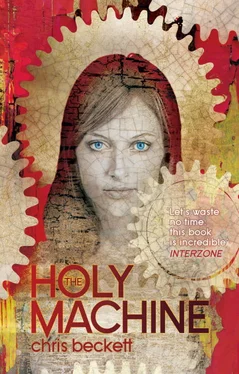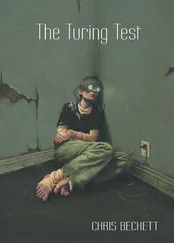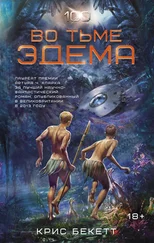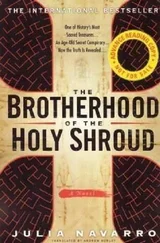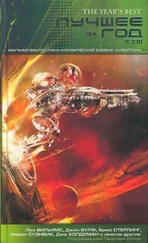Cicadas and crickets kept up their incessant throbbing among the olive trees and pines.
The air was heavy with the aromatic resins of wild herbs baking in the sun. There were goat bells in the distance. A small bird with a scrap of wool in its beak, crossed the sea to a little rocky islet fifty metres off the coast, on which grew a single small pine.
At the top of a little rocky cliff, were the ruins of a Byzantine shrine…
‘But this is Aghios Constantinos!’ I exclaimed.
Little Rose looked up at me smiling and nodding.
‘It’s even better under the moon!’ she said, and the daylight began at once to fade…
‘But it’s a real place, Ruth!’ I said. (The daylight hesitated, unsure whether to proceed, and the sun stopped its descent towards the sea.) ‘We used to go there. We had picnics. I found a tortoise once.’
‘There are tortoises here too,’ she said, ‘Look!’
‘But you can still go to Constantinos and see real tortoises, Ruth!’
Little Rose frowned. ‘I’ll never go back there. Not after what happened.’
Ten years previously a Swiss Illyrian had been kidnapped and murdered by Greek terrorists on that same stretch of coast, close to the border. Our visits had stopped from that date on.
‘Look!’ said Little Rose, ‘A tortoise, see, right down by your feet!’
I had not expected to meet Marija Mejic again after her visit to us about Shirley. But as it happened our paths crossed not long afterwards. It was at a training event for export companies put on by the governement at the Nora Ullman Institute. Myself and two others – Tony Vespuccio and Ricky Timms – were there to represent Word for Word. Marija was one of the representatives for the Illyria Cybernetic Corporation.
Ricky was a sort of friend of mine. He was a year younger than me and a victim to raging adolescent acne at the age of twenty-one. We used to get drunk sometimes and talk about programming and sport and various cult TV programmes aimed at immature young men like ourselves. Sometimes we used to go down to the sea front and fool around in the arcades. We didn’t actually like each other much.
Tony was a little older than us and a lot more experienced.
At the seminar we were divided into small groups of four, each of which was supposed to look at various practical problems involved with exporting technology-based equipment to the medieval and theocratic states beyond our borders. (Illyria relied on these states, after all, to provide it with food, raw materials and, in spite of robots and syntecs, labour.)
In my group were Ricky, Tony and Marija.
Marija remembered me.
‘We never found that robot of yours you know,’ she said.
I muttered something about how the replacement seemed to work fine.
‘Is your wife alright?’ she asked, ‘She seemed really shaken up.’
‘Wife?’ exclaimed Tony incredulously. ‘ Wife?’
I blushed.
Ricky giggled.
I buried myself in the interesting learning exercises provided.
Tony, on the other hand, did not even pretend to be impressed by what the government had laid on for us and he chatted to Marija instead. I listened, fascinated by how easily he seemed to do it.
I learnt that Marija had come to Illyria at the age of eleven from New Zealand when it too, after almost all of the other industrialised nations, was finally engulfed by the Reaction. For her family, it was a return to the Mediterranean, from where they had migrated only a generation previously.
She was tired of her job with ICC and unhappy with the limited options of the little bubble in which we Illyrians lived. She had recently joined the Holist League.
‘Why?’ asked Tony, who lived essentially for pleasure.
‘Illyria was a more generous place when it was founded,’ she said. ‘But I feel that now it’s slowly becoming a mirror image of the countries it was supposed to be a refuge from. The Beacon, for example, was supposed to symbolize the power of free thought. And yet now all kinds of thoughts are banned – even the League has been threatened.’
Tony shrugged. Resignedly, he turned his attention to the task in hand, having come to the conclusion that Marija was dull, even if she was pretty.
But I was interested. I’d always loved the Beacon since I went there with my father as a child. On one occasion, I remember, I had to stay the night with him (I think Ruth had had to go into hospital for some reason or other) and we went up to the top of the Beacon after dark. I’d never seen so much of the world: the dark sea to the west with flecks of phosphorescence and the tiny lights of ships and fishing boats moving across it, the brilliant City immediately below with all its flashing signs, and beyond the city, deep in the Zagorian mountains and up and down the coast, the little yellow lights of the Outland settlements beyond our frontiers: Greek and Shqip and Vlach and Slav…
‘And look at the way we’re supposed to watch old Ullman crumbling that figurine every night,’ said Marija. ‘I mean what does that tell you about this city?’
‘Have you ever tried winding it back?’ I found myself saying, very much to my own surprise.
‘No, I haven’t,’ said Marija, turning her bright, interested eyes on me.
Feeling increasingly awkward, I told her about my experience: the human form assembling itself from dust in Ullman’s godlike hands.
‘It’s as if…’ (I faltered a bit at the end of this unusually long speech). ‘It’s as if the way you see the world depends on the direction you choose to come at it from…’
‘ Exactly! ’ exclaimed Marija. ‘Exactly!’
Tony laughed. When it was time to go, Marija wrote down for me the date of a forthcoming meeting of the League.
‘You’re well in there, George,’ Tony said to me, when Marija said goodbye. ‘Play your cards right and you and she could get together and discuss the meaning of life on a regular basis.’
* * *
Outside night was falling, and the Beacon, which is silvery by day, was lighting up from within to give glimpses of its intricate interior, like one of those transparent water creatures you can watch under a microscope and see its heart beating and the food moving along its gut. Gigantic and yet seemingly weightless, it hovered over its own reflection. People were going in and out of it, up and down it, round and through it like ants in a nest: on staircases, galleries, walkways, escalators. High up in the Beacon‘s great spherical head, people were riding the Ferris wheels that revolved outside.
I walked over to the railings. The sea softly splashed against the stones. From a flagpole above me, the eye of Illyria flapped in a light breeze.
Was Tony joking, or did he really think that someone like Marija might be interested in the likes of me?
I became aware of another sound just below me. A pair of lovers were kissing in the protective darkness of the concrete sea wall, kissing and kissing and kissing, slowly and gently feeding on one another’s mouths.
I went to the meeting of the Holist League. It took place in the function room of a bar in Upper Edison. There were about thirty people there, among them Marija, looking very beautiful in a loose white jumper. She smiled and gestured to the seat beside her. I was still trying to think of something to say when the meeting began and the main speaker was introduced.
It was a philosopher called Paul Da Vera, a strikingly good-looking Brazilian perhaps five or six years older than Marija and myself who spoke with great fluency and wit for about an hour, mainly about the meaning and origin of words.
‘Spirit’ was one of these words, I remember. Da Vera said that pre-technological societies would attribute all kinds of events to the presence of spirits. More technological societies, with more organized religions, would limit spirits to certain locations: there were ‘animate’ and ‘inanimate’ objects, a material and a spiritual world. And then science-based societies, such as Illyria and its precursors, had tried to dispense with spirits altogether.
Читать дальше
